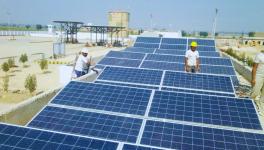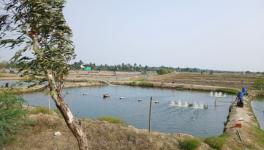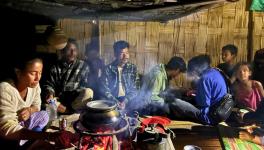Bangladesh: 'Migrant-Friendly' Cities Offer Hope for Climate Refugees
Over the coming years, Mongla aims to attract thousands of climate migrants displaced from nearby coastal regions
The Bangladeshi port city of Mongla, located along the coast of Bay of Bengal, is pioneering a new way for cities to adapt to the climate crisis.
With an 11-kilometer-long (6.8 miles) embankment, a new drainage system and water treatment plant, as well as loudspeakers to warn residents of incoming storms, the city has been steadily investing in infrastructure to make it more resilient in the face of rising sea levels and increasingly severe cyclonic storms.
Its most ambitious investment, however, is in people. Over the coming years, the city aims to attract thousands of climate migrants displaced from nearby coastal regions, in hopes that they would boost the economy and transform Mongla into a thriving industrial hub.
The plan, conceptualized by the research institute International Center for Climate Change and Development (ICCCAD), is part of a broader scheme to alleviate pressure on Dhaka by redirecting climate migrants away from the crowded capital, and instead towards smaller towns and cities.
Working with mayors, locals and NGOs, ICCCAD is helping these new "migrant-friendly" cities to build capacity, so that they can collectively absorb around 10 million migrants over the coming years.
Millions of climate migrants
Rural to urban migration is nothing new in Bangladesh, but climate change is projected to accelerate movement across the country. A World Bank report from 2018 predicted that over 13 million people in the South Asian country, or around 1 in 7, would be displaced by climate change by 2050.
"It's a trickle now, but it's going to get bigger and bigger over the coming years," said Professor Saleemul Huq, director at ICCCAD.
Mongla promises to provide sustainable employment to thousands of climate migrants
Historically, migrants have made their way to Dhaka. But the capital, one of the world's fastest growing megacities, is already overcrowded and poorly equipped to handle the country's growing migration crisis; around a third of people in the city already live in slums.
"The possibility of another 10 million climate migrants arriving and living in the slums of Dhaka city is something that will be very, very difficult to manage," Huq pointed out.
While coastal adaptations such a salt-tolerant rice may help families to avoid migration in the short term, they cannot provide a sustainable solution to the threat of rising sea levels and increasingly erratic weather, the expert noted.
"What we are trying to do is to see whether there are other ways of anticipating this problem. And deal with it before it becomes a crisis."
A model of urban adaptation to climate change
ICCCAD has identified dozens of satellite cities with the ability to absorb around half a million migrants each, selected based on their proximity to economic hubs such as ports or export processing zones.
While housing and schools are important in the long-term to ensure integration with the host population, "the number one draw for any migrant is economic," Huq said.
Mongla, the first city to adopt the ICCCAD recommendations, now acts as a model of what urban adaptation to climate change could look like.
With its large export processing zone and growing economy, the city promises to provide sustainable employment to thousands of climate migrants.
Makul Begum is one of them, having arrived in the city with her husband and three children last year in search of employment.
The small village where the family came from, an hour outside of Mongla, was flooded during Cyclone Aila in 2009, destroying their home and livelihood.
"The fish farm was flooded," the 30-year-old said. "The water was like a poison, all the fish died." With no source of income, the family was forced to take out a loan and sell jewelry in order to survive.
Mongla city in Bangladesh offers new hope to climate refugees by pioneering a new way to adapt to the climate crisis
'Positive approach' to migration
Since moving to Mongla, Begum has worked in the nearby export processing zone, sewing leather goods for 10,000 taka (€103, $106.69) per month. Foreign investment in the city's export processing zone from countries such as China has increased in recent years, creating thousands of new jobs.
Infrastructure projects, such as a new railway line and river dredging to widen the channel for bigger ships, will also help to boost economic growth, said the city's mayor Sheikh Abdur Rahman.
"If these projects — especially the railway, bridge and river dredging — are completed, many factories will be created here and many migrants can find jobs," he underlined, adding that the city has already seen huge changes over the past decade.
"Ten years ago, there was nothing here. Now there are 10,000 workers in the export processing zone," he said.
Huq said Mongla is the first city to have implemented plans laid out by ICCCAD and he's confident that others will follow.
The expert hopes that the city will offer an alternative vision of adaptation for countries around the world facing increasing climate-induced migration.
It gives migrants the choice of "when they want to go, where they want to go, and how they want to go. Instead of being forced to go, which is what is happening now," he said. "It is a way forward that takes a positive approach to the issue of migration."
Edited by: Srinivas Mazumdaru
Get the latest reports & analysis with people's perspective on Protests, movements & deep analytical videos, discussions of the current affairs in your Telegram app. Subscribe to NewsClick's Telegram channel & get Real-Time updates on stories, as they get published on our website.


























